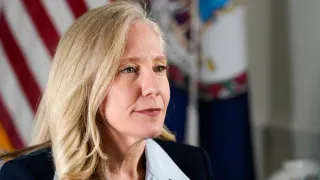March 6, 2015
Alan Cumming Launches 'The Celibacy Challenge' Against FDA
Winnie McCroy READ TIME: 4 MIN.
It's the ultimate challenge for a do-gooder: abstaining from sex for an entire year, just to donate blood. In December 2014, the Food and Drug Administration relented on their 30-year discriminatory policy preventing men who have sex with men (MSM) from donating blood -- provided they abstain from sex for a year.
Although legal experts applauded the move for bringing the health policy in line with other gains for LGBTs, critics said that it was too incremental, not based on science, perpetuated stigma and blocked more than half of this new population of potential donors.
"Stereotypes have no place in saving lives," GLAAD President and CEO Sarah Kate Ellis said in a press release. "The FDA's proposed change still means that countless gay and bisexual men will be turned away from blood banks simply because of who they are."
GLAAD and GMHC agreed, and teamed up with Saatchi & Saatchi New York to call attention to this troublesome policy. And rather than put their tired nose back to the grindstone, they are approaching the campaign with humor, and the help of spokesman Alan Cumming.
Enter The Celibacy Challenge, a provocative new campaign to bring attention to the FDA's new blood donation policy, and how difficult it is to meet the criteria. Because of their batch assay screening methods, the FDA says, "compelling scientific evidence is not available at this time to support a change to a deferral period less than one year while still ensuring the safety of the blood supply."
But critics see it the policy as yet another policy that stigmatizes and reduces gay men down to their HIV serostatus.
"Since the early days of the epidemic, GMHC has witnessed firsthand how fear, stigma and discrimination have fueled the spread of HIV," said GMHC CEO Kelsey Louie. He said the revised policy only reinforced "the outdated stereotype that HIV is only a 'gay disease.'"
Johnnie Ingram, creative director at Saatchi & Saatchi, agreed, recalling the time he was turned away from trying to donate blood at a work event.
"It was so embarrassing! I felt less than human," said Ingram. "I had been in a monogamous relationship for seven years, and I didn't understand why I'd been turned away."
That shame prompted him to help craft a relevant response to the FDA's blood ban that was hot and topical, and relied on regular people to help share the idea and further the campaign.
This first-ever campaign for 'blood equality' uses a humorous video to illustrate how unrealistic it is to ask someone to remain celibate for a year. Cumming offers up approved alternatives to sex, such as obsessively polishing your trophies, taking up carpentry, excessive workouts and compulsively popping champagne bottles.
They decided to use humor as a way to break through the social media chaos and highlight this policy change, with Ingram saying, "We respectfully have a sense of humor, and encourage people to try and take this yearlong celibacy challenge, and if they want, they can opt out and fail."
Because the campaign didn't have much funding, it was important that they found the right celebrity to be its spokesperson. Ingram said that Cumming was a perfect fit, tackling the project with a guerilla-style tact and rewriting the script to fit his personality. They couldn't be happier with how the highly humorous video turned out.
Viewers are asked to share this funny video on their social media, with the hashtag #CelibacyChallenge, and to share a petition calling on the FDA to modify their policy. The video has more than 150,000 views, but the petition only has about 16,000 signatures.
"We've got to get more signatures to get the FDA's attention," said Ingram. "Ultimately, we wanted to accomplish saving lives -- at the end of the day, that's the goal of blood donations. But we also wanted to bring awareness to this ridiculous policy change," which he said many people were unaware of, according to a recent poll.
Ingram said he thinks the FDA's policy should be based on sexual promiscuity as opposed to sexual orientation, and that "the government should be respectful to all communities and people. But I think this policy is still based upon stereotypes, and feels discriminatory."
As recent media attention has been focused on gay marriage, other issues that affect the LGBT community have fallen under the radar. Now, said Ingram, it is time to bring back awareness to these issues.
"Ultimately, we want each and every person who wants to save a life be allowed to. Ultimately, we want to change the policy so it's no longer discriminatory," said Ingram. "Right now, though, we are in the awareness stage. It's very important for people to sign this petition, to talk about this issue and share the video with friends and family members. It's a long haul, but the great thing is that we have voices that we can use for the greater good."
For more information or to sign the petition, visit www.CelibacyChallenge.com






